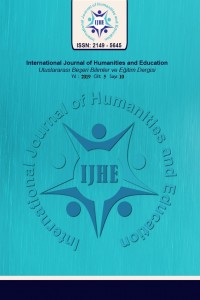Öz
This article shares the experiences of interviewing the relatives of the missing persons whom are the secondary
victims in the context of the decades long frozen conflict of Cyprus. Issues of identity of the interviewees and the
researcher and ethics in interviewing the people living in divided societies will be examined. The Turkish and Greek
Cypriots, continue to live with the agony of missing persons. They are anxious to find out the fate of their loved ones,
waiting for Committee of Missing Persons to finalize all the cases of the missing persons. The irresolvable situation tends
to block families’ cognition, coping and stress management, and freeze the grief processes. Process of interviewing
secondary victims still grieving is accompanied with the context specific challenges. In this research beside the
challenges of interviewing secondary victims of divided Cyprus, the feelings and thoughts of the interviewees, findings
and results of the interviews are shared.
Anahtar Kelimeler
Kaynakça
- Aberbach, D. Joel and Rockman, A. Bert.2002.“Conducting and Coding Elite Interviews”Political Science and Politics Vol. 35, No. 4.673-676.
- Alshenqeeti, Hamza.2014. “Interviewing as a Data Collection Method: A Critical Reviewa“ English Linguistics Research, Sciedu Press Vol. 3, No. 1;201. Boss, P. 1999. Ambiguous loss: Learning to live with unresolved grief. Cambridge, MA, US: Harvard University Press.
- Brouneus, Karen. 2003. Reconciliation – Theory and Practice for Development Cooperation, Published by Sida 2003 The Department for Cooperation with Non-Governmental Organizations and Humanitarian Assistance.
- Cassia, Paul Santa.2007. Bodies of evidence: burial, memory and the recovery of missing persons in Cyprus Journal of the Royal Anthropological Institute. 13(3).778-779.
- Chaitin, Julia. 2002. How Do I Ask Them About the War? Collecting and Understanding Life Stories of Soldiers and Victims of War (written at IACM 15th Annual Conference). SSRN: https://ssrn.com/abstract=304580 or http://dx.doi.org/10.2139/ssrn.304580. Conroy, L. Dennis. 2016. “Secondary victims” Saint Mary’s University of Minnesota, August 8, 2016. http://www2.smumn.edu/archive/news/2016/08/08/secondary-victims/index.html
- Custer, D. 2014. Autoethnography as a Transformative Research Method. The Qualitative Report..https://nsuworks.nova.edu/tqr/vol19/iss37/3. De Alwis. M. 2009. Disappearance and Displacement in Sri Lanka.Journal of Refugee Studies, 22(3): 378-391.
- Du Plessis,Willemien. 2004.The South African Truth and Reconciliation Commission: ‘The Truth Will Set You Free’inFoblets.169-200.
- Ericson. Maria. 2001.Reconciliation and the Search for Shared Moral Landscape: An Exploration Based Upon a Study of Northern Ireland and South Africa.Lund University Publications.http://lup.lub.lu.se/record/20338.
- Faustmann, Hubert andKaymak.Erol. 2008. Cyprus. European Journal of Political Research,46 (7‐8), 916-928.
- *Fish, M. Steven. 1995. Democracy from Scratch: Opposition and Regime in the New Russian Revolution. Princeton: Princeton University Press.
- Küçük P. Gülden. 2017 Turkish Cypriot member of CMP, interview June.
- Hahn, Jeffrey.2013. “Attitudes towards Reform among Provincial Russian Politicians.” Post-Soviet AffairsVolume 966–85.
- Harvey, S.William.2010.“Methodological Approaches for Interviewing Elites” volume 4/3. 193205 https://doi.org.
- Higley, John, and GyörgyLengyel, 2000.Elites after State Socialism: Theories and AnalysisNew York: Rowman and Littlefield.
- Hoffmann-Lange, Ursula. 1987. “Surveying National Elites in the Federal Republic of Germany.” in ‘Research Methods for Elite Studies’, eds. George Moyser and Margaret Wagstaffe. Boston: Allen &Unwin.
- *Hunt, William H., Crane, Wilder W., and Wahlke, John.C. 1964. “Interviewing Political Elites in Cross-Cultural Comparative research”. American Journal of SociologyVolume 70, No: 1, 59-68.
- Imber-Black, Evan. 1993.Secrets in Families and Family Therapy. New York: WW Norton and Co. Inc. Jenkins, Lesley, 1999. Talking Together: A Guide to Community Oral History Projects, Brisbane: Oral History Association of Australia- Queensland.
- Jones, Stacy Holman, Adams, Tony E., & Ellis Carolyn(Eds.). 2013. Handbook of Autoethnography. Walnut Creek, CA: Left Coast Press, Inc.
- KıbrısKonusu.2018.http://mfa.gov.ct.tr/tr/.
- Ladisch, Virginie. 2007. “The challenge of peace-building: Cypriot views on reconciliation”. The Cyprus Review, 19(1).91-107.
- Malhotra, N. K., Birks, D. F., and Wills, P. 2012. Marketing Research: An applied approach (4thed.). New Jersey: Pearson Education.
- McEvoy, Joanne. 2006. “Interviewing in a Divided Society: Lessons from Northern Ireland” Politics, Volume 26(3), 184-191.
- MFA (Ministry of Foreign Affairs), 2018.https://www. mfa.gov.tr
- Minority Right Group International 2010.Retrieved Jan 11 2018 from http://www.ohchr.org.
- Morris, Zoe Slote, 2009 ‘The Truth about Interviewing Elites’,Politics 29, No.3 209-217. Neal, Sarah & McLaughlin, Eugene, 2009,“Researching Up? Interviews, Emotionality and PolicyMaking Elites”Journal of Social Policy / Volume 38 / 4, 689 – 707.
- Remington, Thomas F. 2001. The Russian Parliament: Institutional Evolution in a Transitional Regime, 1989–1999. New Haven: Yale University Press.
- Rivera, SharonWerning, Kozyreva, Polina M. &Sarovskii Eduard G. 2002.,“Interviewing Political Elites: Lessons from Russia” PS:Political Science and Politics, Volume 35/4, 683688.https://www.jstor.org.
- Rohrschneider, Robert. 1999. Learning Democracy: Democratic and Economic Values in Unified Germany. New York: Oxford University Press. Strauss, A. & Corbin, J. 1990.Basics of Qualitative Research. London, UK: Sage Publications.
- Yıldırım, Ali &Şimsek, Hasan2008.SosyalBilimlerdeNitelAraştırmaYöntemleri (7. Basım), Ankara: SeçkinYayınları.
- Zimmerman, William. 2002. The Russian People and Foreign Policy: Russian Elite and Mass Perspectives, 1993–2000. Princeton: Princeton University Press.
Ayrıntılar
| Birincil Dil | İngilizce |
|---|---|
| Bölüm | Araştırma Makalesi |
| Yazarlar | |
| Yayımlanma Tarihi | 30 Nisan 2019 |
| Gönderilme Tarihi | 8 Nisan 2019 |
| Yayımlandığı Sayı | Yıl 2019 Cilt: 5 Sayı: 10 |
Uluslararası Beşeri Bilimler ve Eğitim Dergisi
Bu eser Creative Commons Alıntı-Gayri Ticari-Türetilemez 4.0 Uluslararası Lisansı (CC BY-NC-ND 4.0) ile lisanslanmıştır.


